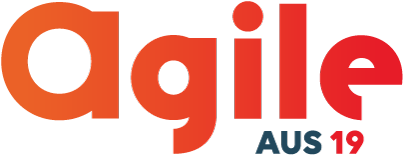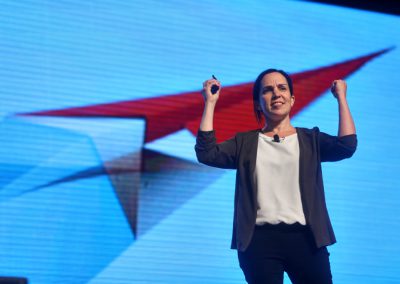Program process
Building the AgileAus program is a community-led process that benefits from the dedication and expertise of a 40+ strong team of stream chairs, reviewers and program guides.
In 2019, members of the community were encouraged to submit short and sweet ‘kernels’ of ideas for speakers or topics in the form of Expressions Of Interest (EOIs). Once submitted, these EOIs receive feedback from a welcoming community before being reviewed in March 2019 and potentially progressing to feature on the AgileAus19 program.
EOI authors were able to:
- Submit up to three speakers/topics/ideas anonymously (or not!)
- Opt in or out of feedback on their EOI
- Write as little or as much as they want
You can find out more about the formation of the AgileAus EOI process here »
In March 2019, reviewers are busily commenting on and reviewing EOIs to produce shortlists which are then whittled down again to create a balanced program. In April 2019, speakers and topics are revealed.
For more key dates, please click here »
AgileAus19 Streams
AgileAus content will be organised into the following streams:
Closer to the customer
Despite the second principle of the Agile manifesto advising us to “Welcome change… Agile processes harness change for the customer’s competitive advantage,” many Agile teams fall into the trap of becoming rigid feature factories.
Have we neglected the ‘why’ that lies behind our efforts to become more adaptive in our approaches?
In a world where technology is replacing human interactions, businesses are often overlooking the importance of connecting with their users. We must move beyond the idea of designing products based on assumptions, and instead focus on delivering experiences with deep human connections to match the people who will be using them.
As organisations reach for the Agility brush to paint their organisational change, and as other disciplines and approaches are added to the mix, we would like to hear:
- What are the best examples of true customer centricity?
- What has worked to bring your customers competitive advantage?
- What tools, methods and mindsets do you employ?
- How do you ensure that a collaborative, Agile and unified team is well equipped to solve real customer problems?
Want to find out more about what the reviewers in this stream are after? Please click here »
Leading change
Change is inevitable and everyone attending Agile Australia is leading change in some way — whether it is in a small and everyday sense or at a larger scale.
In this stream, we are seeking:
- Examples of leadership at any level.
- Sessions to provoke our thinking and inspire us to lead.
- Interesting examples of change from all types of organisations.
In all of these cases, we are interested in the lessons learnt and outcomes achieved – especially in the areas listed below:
- How were/are supporters and resistors managed in the examples?
- Was alignment and shared vision important to the outcome?
- Is the adoption ‘sticky’ — is it lasting and are there metrics to demonstrate this?
The fundamentals
Whether you are new to Agile or have been using the practices for many years, the fundamentals are the foundation of Agile ways of working. Using the four values and 12 principles of the Agile Manifesto as a base, the community has evolved a large catalogue of frameworks and practices, which can be a challenge to understand and navigate.
In this stream, we are seeking immersive and thought-provoking sessions that offer:
- Clear interpretations of fundamental Agile concepts, practices and disciplines.
- Explanation of the key roles and role changes required in an Agile team and throughout the organisation.
- Stories of Agile adoption that share the successes and failures from an individual and team level through to an organisational level.
- Helpful advice, processes and patterns for approaching common organisational issues.
Sessions in this stream should provide a mental structure that can be built upon throughout the Conference, as well as tools and techniques that can be taken back to the workplace and immediately trialled.
The learning organisation
In today’s environment, the faster learner thrives. The learning organisation – which is not quite the same as an organisation where people learn – is skilled at modifying its behavior and form to reflect new knowledge and exploit new insights. It’s a culture that learns from its mistakes, a culture that is curious, that asks questions of what we do today to find the answers for tomorrow. One that looks both inwardly and outwardly to continually innovate and try new things. It’s one that has learned to coach itself and rewards people who take risks rather than punishing them, one that has created safety and trust.
Talks covering the following kinds of topics would be welcome:
- How are you building a learning organisation into your organisation’s DNA?
- How do you create the space for people to learn in your organisation?
- What great stories of mistakes or failures leading to learning can you share for the edification of others?
- Do you have tips and tricks for moving individual’s learning to organisational learning?
- Do you publish your mistakes internally or externally? How do you do it? What results or outcomes has that produced?
- Data: it’s the new black. How do you use data to help direct your organisation’s learning ability? What do you measure, and why? How has it contributed to growth or success?
Want to find out more about what the reviewers in this stream are after? Please click here »
Towards technical excellence
In the spirit of the ‘seeking the Agile mindset’ theme, this stream seeks talks that highlight the evolution of the technology and technical practices that underpin the Agile delivery of software.
Talks should focus around themes like:
- How can teams
optimise the delivery of business value using technology? - What technologies and/or practices can help
an learn to be more Agile, and learn to be “better”?organisation - How can we use technology to simplify and/or streamline the development process to get to production more rapidly and deliver value sooner?
- How has adopting Agile impacted your approach to architecture, design, and
development practices ?
What we are looking for:
Shaping a program that represents, nourishes, surprises and delights the community is a balancing act!
To help ensure the program is comprised of stories that have potential to inform, enlighten and inspire – the AgileAus community has created some criteria to help attract content that could do just that. You can find out more about what these criteria are here »
Stay in the loop
To receive updates about AgileAus and be subscribed to the mailing list, send us an email with your first name, last name and email address to signup@agileaustralia.com.au.
Follow us on social media and join the conversation using the hashtag #agileaus.
ABOUT AGILEAUS19
ALL THINGS AGILE
The Deep Dive
The AgileAus Hub
The Magazine
Agile Community Calendar
COPYRIGHT SLATTS GROUP PTY LTD

